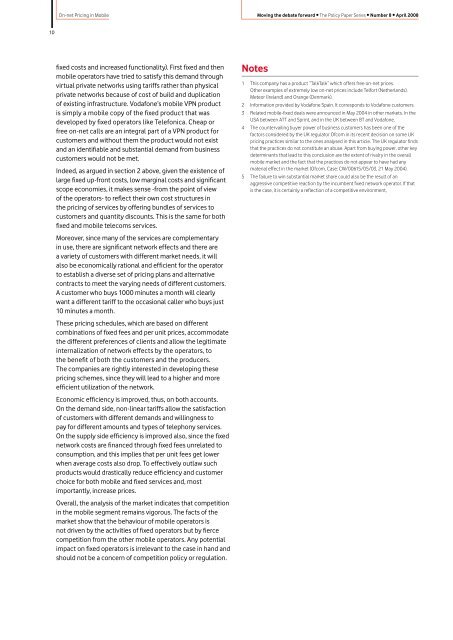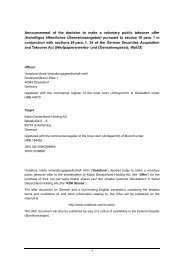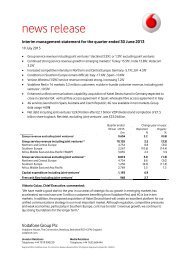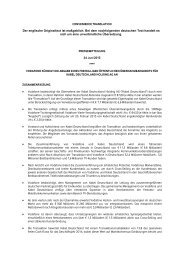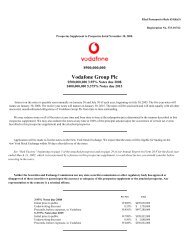You also want an ePaper? Increase the reach of your titles
YUMPU automatically turns print PDFs into web optimized ePapers that Google loves.
10<br />
On-net Pricing in Mobile Moving the debate forward • The Policy Paper Series • Number 8 • April 2008<br />
fixed costs and increased functionality). First fixed and then<br />
mobile operators have tried to satisfy this demand through<br />
virtual private networks using tariffs rather than physical<br />
private networks because of cost of build and duplication<br />
of existing infrastructure. <strong>Vodafone</strong>’s mobile VPN product<br />
is simply a mobile copy of the fixed product that was<br />
developed by fixed operators like Telefonica. Cheap or<br />
free on-net calls are an integral part of a VPN product for<br />
customers and without them the product would not exist<br />
and an identifiable and substantial demand from business<br />
customers would not be met.<br />
Indeed, as argued in section 2 above, given the existence of<br />
large fixed up-front costs, low marginal costs and significant<br />
scope economies, it makes sense -from the point of view<br />
of the operators- to reflect their own cost structures in<br />
the pricing of services by offering bundles of services to<br />
customers and quantity discounts. This is the same for both<br />
fixed and mobile telecoms services.<br />
Moreover, since many of the services are complementary<br />
in use, there are significant network effects and there are<br />
a variety of customers with different market needs, it will<br />
also be economically rational and efficient for the operator<br />
to establish a diverse set of pricing plans and alternative<br />
contracts to meet the varying needs of different customers.<br />
A customer who buys 1000 minutes a month will clearly<br />
want a different tariff to the occasional caller who buys just<br />
10 minutes a month.<br />
These pricing schedules, which are based on different<br />
combinations of fixed fees and per unit prices, accommodate<br />
the different preferences of clients and allow the legitimate<br />
internalization of network effects by the operators, to<br />
the benefit of both the customers and the producers.<br />
The companies are rightly interested in developing these<br />
pricing schemes, since they will lead to a higher and more<br />
efficient utilization of the network.<br />
Economic efficiency is improved, thus, on both accounts.<br />
On the demand side, non-linear tariffs allow the satisfaction<br />
of customers with different demands and willingness to<br />
pay for different amounts and types of telephony services.<br />
On the supply side efficiency is improved also, since the fixed<br />
network costs are financed through fixed fees unrelated to<br />
consumption, and this implies that per unit fees get lower<br />
when average costs also drop. To effectively outlaw such<br />
products would drastically reduce efficiency and customer<br />
choice for both mobile and fixed services and, most<br />
importantly, increase prices.<br />
Overall, the analysis of the market indicates that competition<br />
in the mobile segment remains vigorous. The facts of the<br />
market show that the behaviour of mobile operators is<br />
not driven by the activities of fixed operators but by fierce<br />
competition from the other mobile operators. Any potential<br />
impact on fixed operators is irrelevant to the case in hand and<br />
should not be a concern of competition policy or regulation.<br />
Notes<br />
1 This company has a product “TalkTalk” which offers free on-net prices.<br />
Other examples of extremely low on-net prices include Telfort (Netherlands),<br />
Meteor (Ireland) and Orange (Denmark).<br />
2 Information provided by <strong>Vodafone</strong> Spain. It corresponds to <strong>Vodafone</strong> customers.<br />
3 Related mobile-fixed deals were announced in May 2004 in other markets. In the<br />
USA between ATT and Sprint, and in the UK between BT and <strong>Vodafone</strong>.<br />
4 The countervailing buyer power of business customers has been one of the<br />
factors considered by the UK regulator Ofcom in its recent decision on some UK<br />
pricing practices similar to the ones analysed in this article. The UK regulator finds<br />
that the practices do not constitute an abuse. Apart from buying power, other key<br />
determinants that lead to this conclusion are the extent of rivalry in the overall<br />
mobile market and the fact that the practices do not appear to have had any<br />
material effect in the market (Ofcom, Case: CW/00615/05/03, 21 May 2004).<br />
5 The failure to win substantial market share could also be the result of an<br />
aggressive competitive reaction by the incumbent fixed network operator. If that<br />
is the case, it is certainly a reflection of a competitive environment,


